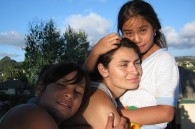By Alejandra Ardila Sánchez, VE Volunteer, January 2013
The experience of being a volunteer in another country.
My name is Alejandra. I have a bachelor’s degree in Child Education and I live in Bogotá, the capital of my beautiful country, Colombia. Four years ago, I started to work as a teacher and since then, I have always waited for the opportunity to get to know other children’s experiences (realities), because I think there can’t be just one, but many as a product of a wide range of economic, social, cultural and political differences that we have all across the world. For this simple reason, I dedicated my time to look for a scenario that would help me learn more about different childhood experiences so that I can teach and find a new meaning in the work that I do…education. Even though it is not easy leaving behind your home and your family, I decided to travel to another Latin American country that has demonstrated significant advances regarding education as a pathway to progress and memory recovery as a way to keep the political spirit alive in their society, so, here I am.
Two weeks ago, I started as a volunteer in Hogar San Francisco, a children’s home that is looking to reestablish the violated rights of young girls and to protect them from an environment that treats them in a hostile manner. So we arrived there, my co-workers and I, to be part of their everyday life, with a lot of high expectations on what we could do: play, run, talk to the young girls, teach them how fun it is to read, go out for walks, draw, etc. A great outlook and very eager to start. Each time I walked into a room in the home, I would see young girls of different ages and I would remind myself of my goal, “Offer them new learning experiences,” but the more time I spent with them, the more my blindfold fell from my eyes and I learned a lesson. Human beings have a virtue of being born again through new experiences, and I was born again with those young girls. I was afraid that I had forgotten about my formal education, I would question myself every second if it would be more appropriate to talk with authority or run the risk to just be seen as another piece of furniture. Occasionally, I would hear kicking, yelling, fighting, laughing, but I would never intervene except to just say, “girls, please, don’t fight” and then I would feel helpless and fragile; I would try to remember how I was able to control my previous groups whenever I wanted them to listen to me. Right at that moment, I learned another lesson: I am not in my country, they are not the same kids, they are not the same age and they don’t live under the same social conditions. I mean, I am standing in front of one of the many childhoods I read while attending college; the only difference is that I am now living the experience.
Time continues to pass by, but I am not the same as when I arrived here. I have learned the names of each of the girls and I assigned myself simple tasks to share with them and learn with them, such as playing in the elastic bed, playing soccer, playing horsy, cutting and pasting, coloring, writing “I love you” in giant posters, inviting them to read with me my way and then have them read to me their way, laugh at their jokes but also send them a look of “that’s not right” occasionally. I also give them lots of hugs and kisses on their foreheads. Time continues to pass me by and I am now able to show them when something bothers me and they understand me just as I have always understood them; I have been here two weeks and in my opinion, my blindfold is completely off my eyes. I have only been here two weeks as a volunteer and I am very proud of these young girls. They have taught me that patience is a never-ending virtue because there are plenty of moments that seem to have no answer but they make them up by using their innocence and their intelligence, and so they show me that only with patience we are able to come out of difficulties. I am also very proud of my co-workers because we work in teams, we listen to one another, and we try to overcome adversity when one of the girls doesn’t want to listen to us. Language differences are not barriers but the bridge that allows us to do the necessary to reach the solution.
It’s been a month since I got to Santiago, Chile, with a firm purpose of being a better professional, but to this day, I have accomplished something better thanks to those young girls and the tías of Hogar San Francisco: I am a better person, more affectionate and relaxed, and because of that, I can say that being a volunteer has made me be born again.



